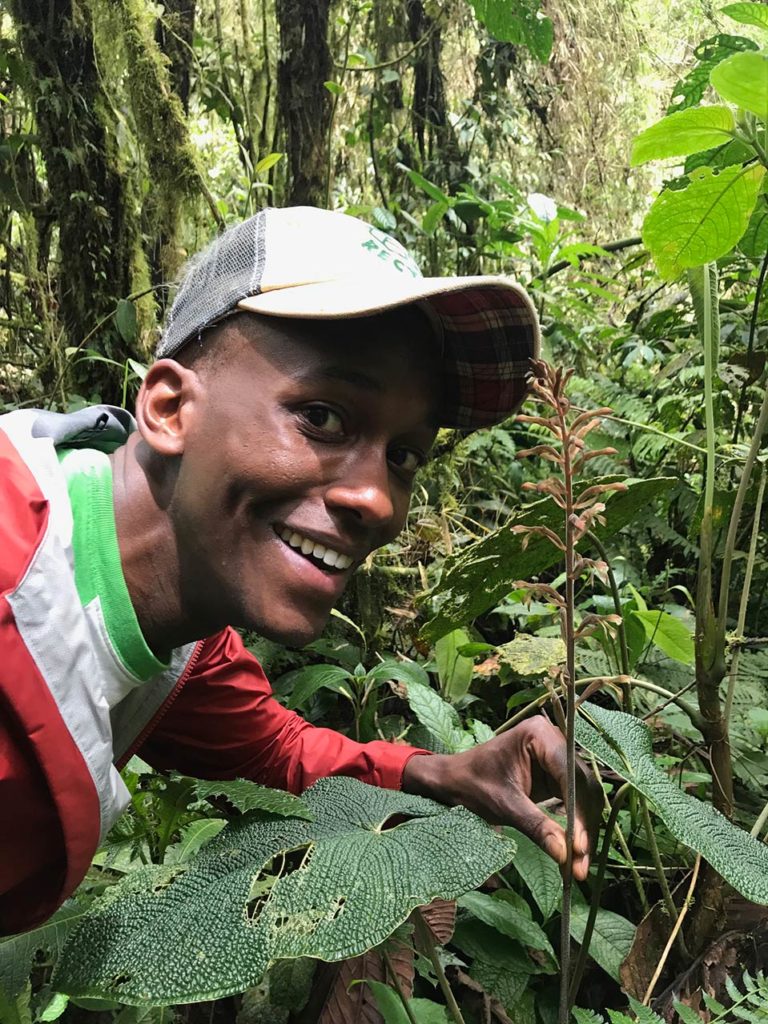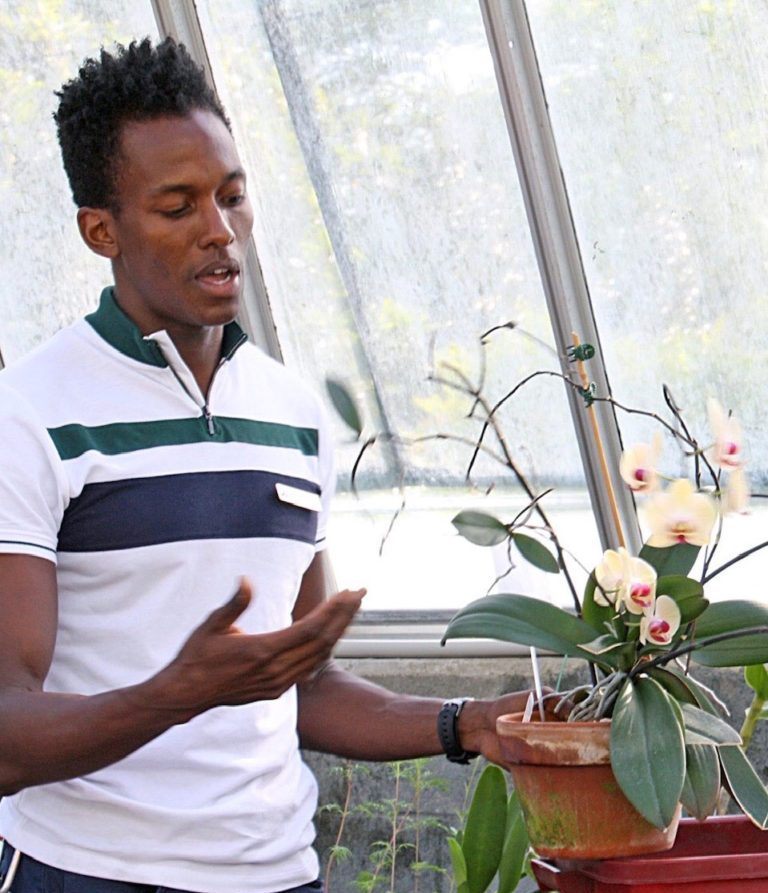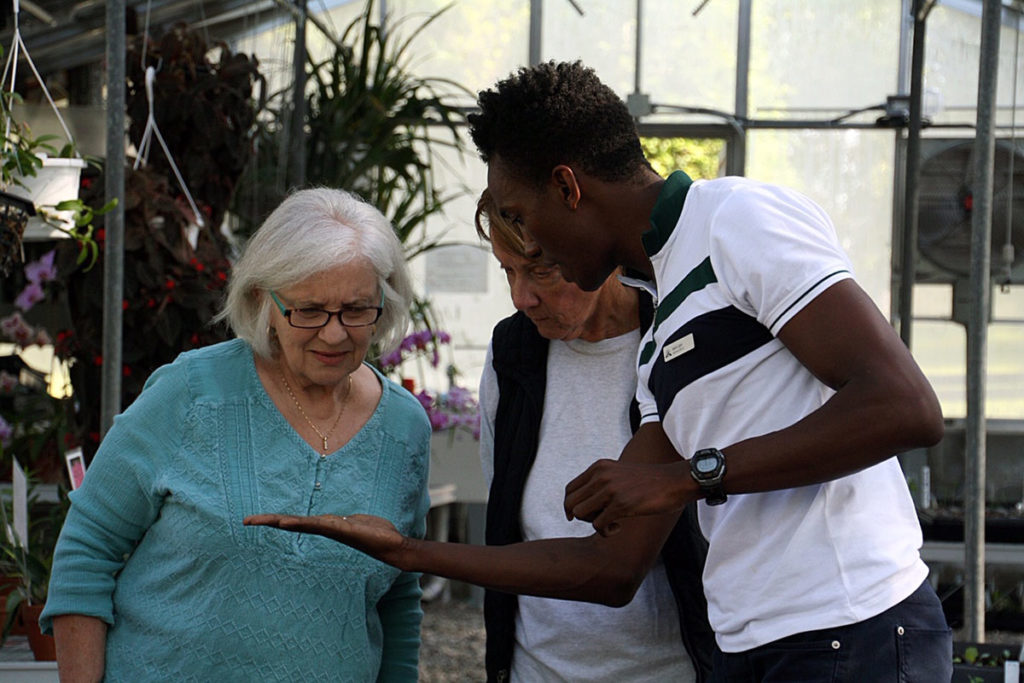Jason Ligon
Applying the horticultural expertise necessary for maintaining botanical gardens to conservation, Jason Ligon’s work exemplifies an important role botanical gardens can play in conservation. The special requirements of orchids have been dialed in by Atlanta Botanical Garden staff to produce plants for the garden and reintroductions, a process Jason has been a key part of while volunteering at the garden and as the Tissue Culture and Seed Bank Coordinator.
When did you first fall in love with orchids?
I had such a once-in-a-lifetime experience working with orchids while studying abroad in Equatorial Guinea. Having that opportunity to see orchid diversity in the wild forever made this family of plants special to me.
What was your path to becoming the Tissue Culture & Seed Bank Coordinator?
Lots of free labor. I interned with the National Park Service and assisted in field research abroad before volunteering for three years at the Atlanta Botanical Garden in multiple capacities. Above all my favorite volunteer position was in the tissue culture lab learning from then Conservation Horticulture Manager Matt Richards. I then worked for four years for the Fuqua Orchid Center here at ABG. That gave me the chance to hone my greenhouse horticulture skills and continue to monitor the seedlings that had been produced from the lab. Now as Tissue Culture & Seed Bank Coordinator I have an amazing opportunity to improve the lab’s yield by addressing issues I had observed in the previous 7+ years while around the garden.
Can you share why micropropagation is a powerful tool in the conservation toolkit?
Micropropagation is such an excellent technique because it is so concentrated. In the lab, versus in the field, you can grow and monitor development of plants in a smaller, more controlled environment. This is especially useful for species with low success rates facing high pressure in situ.
What about working with orchids has surprised you?
You would think that all orchids would share similar characteristics. That may be true when it comes to flower morphology, but the commonality stops there. At a glance, all the containers of seedlings on the shelf in the lab may look the same, but surprisingly many orchid seeds respond drastically to minor changes in vitro. Often a tweak in the recipe of temperature, growth media composition, dormancy length, or surface sterilization technique can change the outcome of a species’ growth.
Are the challenges of conserving temperate orchids different than those of tropical orchids? How have your program’s efforts met those challenges?
In some ways yes. The two categories of orchids have different horticultural needs in the lab that we must always keep in mind. For example, the temperate growing terrestrial orchids need a dormancy period whereas the tropical orchids do not. Also Atlanta’s climate is temperate so traveling farther to collect seed and monitor projects in tropical zones can be problematic. However, to help meet the challenges of our more distant or labor intensive projects, ABG has adapted by establishing partnerships with organizations beyond Georgia and by hiring ample staff that reach beyond Atlanta.
Please share one of your orchid conservation projects and how what you’ve learned could benefit others working to conserve orchids.
I recently became more involved with ABG’s partnership with Jardín Botánico de Quito to conserve the lady slipper orchid, Selenipedium aequinoctiale. Its extremely restricted habitat range in Ecuador puts it at high priority for conservation concern. Through this project, I’ve learned that the shared network of resources is undoubtedly stronger than either organization attempting to pursue conservation efforts alone.
What has been the most challenging aspect of your work?
A lot of what is known to work in ABG’s tissue culture lab has come from trial and error, and learning from those failures and successes. My biggest challenge so far has been honing in on the unexplored in vitro methods that could improve the scope of our operation. Cross referencing new micropropagation research against our historical experimental data has been both frustrating and fun.
Beyond propagation, you have helped with recovery efforts of several species. How has your horticultural background helped inform these efforts?
I’m thankful to have grown so many species of orchids in my greenhouse horticulture background. Now everything else seems easy. To me, horticulture at its core is observing plants in detail over time. That skill can then be taken into the lab or field to make best restoration decisions.
-

Jason visits Ecuador through ABG’s partnership with Jardín Botánico de Quito. -

Visiting habit range in Ecuador to study lady slipper orchid (Selenipedium aequinoctiale) conservation. -

Jason Ligon, Tissue Culture & Seed Bank Coordinator, Atlanta Botanical Garden teaching orchid care at Lockerly Arboretum.
